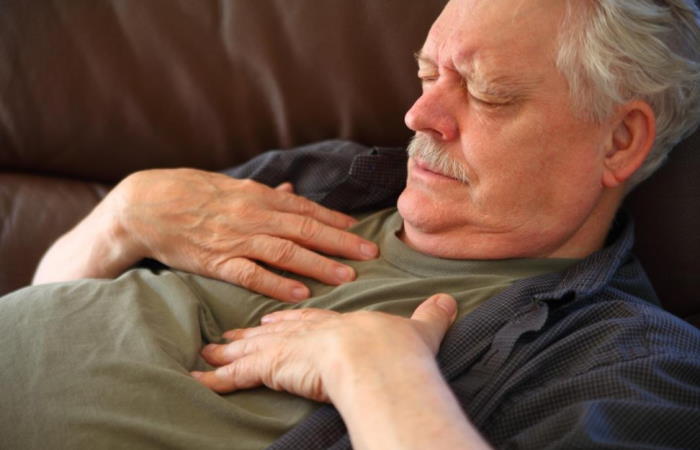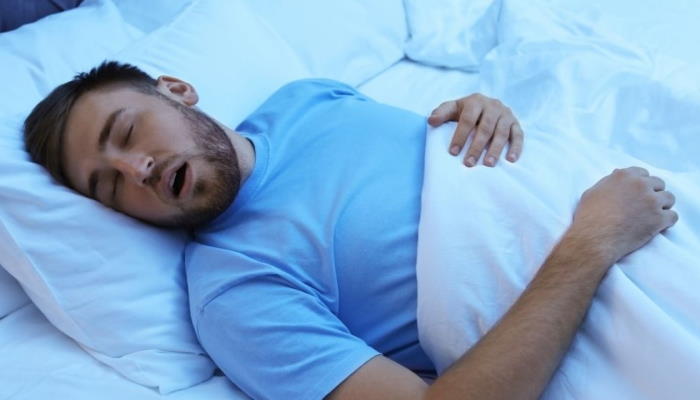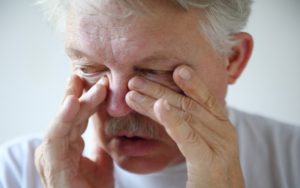Do you often wake up in the middle of the night and find yourself gasping for air? Experiencing shortness of breath after a rigorous physical activity or during moments of high stress is common. However, breathing problems at night, especially when lying down, can be a sign of a serious medical condition.
Shortness of breath when lying down, particularly at nighttime, can be potentially caused by various medical issues. It can be allergies, anxiety, diabetes, sleep apnea, or other lifestyle factors. While difficulty breathing is not always a medical emergency, you should still check it with your doctor for a more thorough diagnosis.
Breathing Problems at Night: What could it be?
Shortness of breath or the feeling of breathlessness is called dyspnea. This happens when the body cannot adequately pump oxygen into the blood. There are a couple of possible reasons here: either the heart can not pump blood effectively, or the lungs may not be able to process oxygen intake.
Some people experience it when lying down flat on their back, which is called orthopnea. People who regularly suffer from this prop their bodies up on pillows so they can sleep better. There are many possible causes for orthopnea, but the two most common are excessive body weight or an underlying heart condition.
In many cases, orthopnea can cause a person to wake up suddenly in the middle of the night, this is called paroxysmal nocturnal dyspnea. Snoring and sleep disorders like obstructive sleep apnea (OSA).
An article from American Family Physician said almost 85% of conditions that trigger chronic breathlessness relate to issues with the lungs, heart, or mental health.
Possible causes of breathing problems at night
Lung conditions
Some lung conditions are chronic and life-threatening, while others are treatable.
Asthma
Asthma happens when there’s inflammation in the lungs. This causes breathing difficulties, such as dyspnea. A person can experience breathing problems at night related to asthma when:
- The sleeping environment triggers asthma
- There is a mucus buildup in the throat causing the person to struggle to breathe and cough
- The sleeping position puts too much pressure on the diaphragm
- Changes in hormones at night
Conditions such as gastroesophageal reflux disease (GERD) can also trigger asthma.
COPD
Chronic obstructive pulmonary disease (COPD) happens when the airways are blocked or narrowed, causing breathing difficulties. This is often accompanied by coughing due to mucus, wheezing, and chest tightness. This is a common problem among people who smoke or those who are regularly exposed to harmful chemicals.
Pulmonary embolism
This happens when blood clots form in the lungs restricting airflow. It is characterized by chest pain, coughing, and swelling. People who are confined to bed for a long period of time can develop this condition. This condition requires emergency medical care.
Heart conditions
Conditions that affect the heart’s ability to pump blood can interfere with breathing as well.
Heart failure
When the heart is unable to pump blood at a sustainable level, it can cause breathing problems. This is called heart failure, and one can develop it for many different reasons. Risk factors include a poor diet that leads to excessive weight, smoking, and certain health conditions. High blood pressure and heart experiences like inflammation, trauma, and irregular heart rates are also associated with heart failure.
Symptoms of heart failure include:
- Shortness of breath
- Palpitation (increased heart rate)
- Buildup of excess fluid in the abdomen, legs, ankles, and feet
- Lack of appetite
- Confusion or impaired thinking
- Nausea
Coronary artery disease often leads to heart attacks. A heart attack is often accompanied by chest pain and tightness, nausea, fatigue, and sweating. When this happens, you should seek emergency care.
Sleep apnea
Characterized by shallow breaths and pauses in breathing while asleep, snoring is the most common reason why people experience breathing problems at night, particularly when lying down. This happens when the soft tissues around the airways collapse and obstruct the airflow, a common scenario when lying on your back.
Snoring is also the most common symptom of OSA; however, OSA is often accompanied by excessive daytime sleepiness, morning headaches, difficulty concentrating and remembering, etc. To help the body breathe, the brain sends panic signals to force the body to jolt to restore breathing patterns. This happens hundreds of times throughout the night, causing fragmented sleep that leads to poor quality of sleep and daytime sleepiness. Often, OSA is also caused by an underlying condition, such as excessive weight (especially obesity).
Allergies
Allergies usually get worse at night, which easily causes shortness of breath. Allergens such as dust, pet dander, mold, pollen, etc., in the sleeping environment, can easily trigger allergic symptoms.
Anxiety and panic attack
As said earlier, mental health is linked to shortness of breath as well. Feelings of anxiety can trigger the body’s fight-or-flight response, which leads to panic attacks. When this happens, the heart beats faster (200 beats per minute, or even faster during a panic attack), causing you to struggle to breathe, feel faint, and become nauseous.
Symptoms of a panic attack include:
- Shortness of breath
- Feeling of choking
- Nausea
- Feeling lightheaded or dizzy
- Sweating
- Heart palpitations
- Pain or discomfort in the chest
- Shaking or trembling
- Numbness or tingling sensation (paresthesia)
- Feeling of being detached (unreality)
- Fear of loss of control
- Fear of death
When to see a doctor
Difficulty breathing that is not related to strenuous activity such as intense exercise, poor air quality, exposure to extreme temperature, high altitude, or obesity could be a cause of concern.
If the breathlessness is accompanied by fainting, chest pain, or nausea, there’s a chance it is related to a more serious medical condition. If you suddenly experience these symptoms, especially when lying down at night, then it is best to seek medical evaluation and care.
Seek help if you:
- Experience breathlessness when lying flat on your back
- The problem is worsening or prolonged
- See swelling on your feet
- Experience flu-like symptoms
- Have blue lips and/or fingers
- Hear a high-pitched sound when breathing
- Wheezing
Takeaway
As said earlier, shortness of breath and difficulty breathing can be caused by many different things. Different reasons and underlying conditions require different care and treatment. Thus, it is best to check with your doctor for a more thorough diagnosis.


























